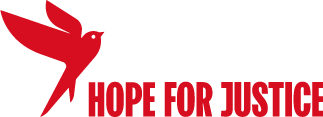Coalition demands end to means testing of legal aid for survivors of trafficking
This article is reprinted from its original location at Hope for Justice‘s website. It was pulled from their RSS feed for your education.
Hope for Justice, as part of a coalition of trafficking and legal experts, is calling for survivors of modern slavery and human trafficking to be entitled to legal aid that is not means tested.
The evidence and documents that the authorities demand as part of the current means testing regime are often impossible for people who have been trafficked to fulfil without significant ongoing independent advocacy and support. This is because of the fluctuating financial circumstances of many survivors.
As survivors move on from their experiences and find legitimate work – often a key aspect of recovery – the low thresholds can result in them being denied full access to legal aid and representation. But they cannot afford any legal representation without legal aid funding.
As a result, many survivors are denied the help they need and cannot afford.
The call to stop means testing of legal aid for survivors comes in response to a consultation on the Ministry of Justice's proposed changes to the Legal Aid Means Test Review, first announced in 2019.
In Hope for Justice's experience of providing socio-legal independent advocacy through our Independent Modern Slavery Advocacy (IMSA) model, we recognise that survivors often have complex legal and support needs. Access to early, specialist legal advice and representation is critical.

Survivors often require assistance to access legal advice and representation on matters including immigration and asylum, criminal law (non-prosecution), civil compensation, criminal injuries compensation, community care, welfare benefits, housing, debt advice and public law issues.
It is ultimately a question of access to justice and of enabling survivors to understand their rights, access support, recover and obtain restitution. This reduces the risk of victims becoming destitute, homeless, being deported or being vulnerable to further exploitation and re-trafficking.
Hope for Justice joined with Anti Trafficking Labour and Exploitation Unit (ATLEU), Focus on Labour Exploitation (FLEX), Simpson Millar and Survivor Collective to respond to the government consultation, which ran between March 5 and June 7, 2022.
In a joint briefing, we have urged the proposals to go further in addressing the unique and diverse financial circumstances of survivors. We are calling on the Ministry of Justice to ensure that survivors of modern slavery and human trafficking are entitled to non means tested legal aid.
Phillipa Roberts, Hope for Justice's Head of Policy and Research, said: “This change would be the most effective way to ensure that survivors can access the legal advice and representation they need, while also removing a substantial administrative burden for legal aid providers that stops many of them taking on trafficking survivors' cases.”
Read the full briefing here: Joint submission – Legal Aid Means Test Review.
This “Eyes on Trafficking” story is reprinted from its original online location.

ABOUT PBJ LEARNING
PBJ Learning is a leading provider of online human trafficking training, focusing on awareness and prevention education. Their interactive Human Trafficking Essentials online course is used worldwide to educate professionals and individuals how to recognize human trafficking and how to respond to potential victims. Learn on any web browser (even your mobile phone) at any time.
More stories like this can be found in your PBJ Learning Knowledge Vault.
EYES ON TRAFFICKING
This “Eyes on Trafficking” story is reprinted from its original online location.
ABOUT PBJ LEARNING
PBJ Learning is a leading provider of online human trafficking training, focusing on awareness and prevention education. Their interactive Human Trafficking Essentials online course is used worldwide to educate professionals and individuals how to recognize human trafficking and how to respond to potential victims. Learn on any web browser (even your mobile phone) at any time.
More stories like this can be found in your PBJ Learning Knowledge Vault.

